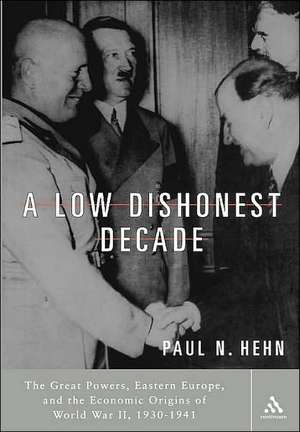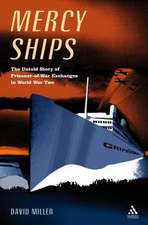A Low, Dishonest Decade: The Great Powers, Eastern Europe and the Economic Origins of World War II, 1930-1941
Autor Paul N. Hehnen Limba Engleză Paperback – 30 sep 2005
Preț: 169.65 lei
Preț vechi: 261.17 lei
-35% Nou
Puncte Express: 254
Preț estimativ în valută:
32.46€ • 35.37$ • 27.35£
32.46€ • 35.37$ • 27.35£
Carte tipărită la comandă
Livrare economică 23 aprilie-07 mai
Preluare comenzi: 021 569.72.76
Specificații
ISBN-13: 9780826417619
ISBN-10: 0826417612
Pagini: 536
Ilustrații: 1
Dimensiuni: 148 x 226 x 31 mm
Greutate: 0.69 kg
Editura: Bloomsbury Publishing
Colecția Continuum
Locul publicării:New York, United States
ISBN-10: 0826417612
Pagini: 536
Ilustrații: 1
Dimensiuni: 148 x 226 x 31 mm
Greutate: 0.69 kg
Editura: Bloomsbury Publishing
Colecția Continuum
Locul publicării:New York, United States
Recenzii
"A richly detailed study of the trade conflicts sparked by Eastern Europe, particularly the Balkans, in the decade preceding the Second World War."-German Studies Review
"Written by 'a child of the era,' this book is announced as a correction to the two major diplomatic interpretations of the origins of WW II: Gerhard Weinberg's two-volume Foreign Policy of Hitler's Germany, which stresses Nazi ideology and Hitler's primary responsibility for the outbreak of WW II, and A.J.P. Taylor's The Origins of the Second World War, which places Hitler and Nazi Germany within a malfunctioning international system. Using earlier studies by Dietmar Petzina, Hans-Jürgen Schroeder, and Timothy W. Mason and his own extensive research in unpublished British, French, German, Italian, Polish, US, and Yugoslav diplomatic records as well as in a wealth of published primary and secondary sources, Hehn argues that the political, ideological, and diplomatic maneuvers that took place during Auden's 'low, dishonest decade' masked a fundamental Anglo-German 'imperialist' struggle for raw materials, markets, and military, and economic hegemony in Eastern Europe....The overall result is an ambitious, sprawling study, laced with opinions and statistics that provide a materialist explanation for Hitler's aggressiveness and Western appeasement in the 1930s."-Choice
"Fixing on Eastern Europe as the focus of the fierce contest for markets, Hehn sees economic factors as at least as crucial in the post-Versailles world as military, political and ideological ones. Although this focus downplays the obsession with racist ideology that drove Hitler, Hehn's imperialist theme is compelling....Hehn's quotes, sometimes private ones, are withering. His analysis targets not only the usual villains but the failures, hypocrisies, greed and venality of England, France and the United States, and powerfully argues for their role in bringing on WW II."-Publishers Weekly
"Written by 'a child of the era,' this book is announced as a correction to the two major diplomatic interpretations of the origins of WW II: Gerhard Weinberg's two-volume Foreign Policy of Hitler's Germany, which stresses Nazi ideology and Hitler's primary responsibility for the outbreak of WW II, and A.J.P. Taylor's The Origins of the Second World War, which places Hitler and Nazi Germany within a malfunctioning international system. Using earlier studies by Dietmar Petzina, Hans-Jürgen Schroeder, and Timothy W. Mason and his own extensive research in unpublished British, French, German, Italian, Polish, US, and Yugoslav diplomatic records as well as in a wealth of published primary and secondary sources, Hehn argues that the political, ideological, and diplomatic maneuvers that took place during Auden's 'low, dishonest decade' masked a fundamental Anglo-German 'imperialist' struggle for raw materials, markets, and military, and economic hegemony in Eastern Europe....The overall result is an ambitious, sprawling study, laced with opinions and statistics that provide a materialist explanation for Hitler's aggressiveness and Western appeasement in the 1930s."-Choice
"Fixing on Eastern Europe as the focus of the fierce contest for markets, Hehn sees economic factors as at least as crucial in the post-Versailles world as military, political and ideological ones. Although this focus downplays the obsession with racist ideology that drove Hitler, Hehn's imperialist theme is compelling....Hehn's quotes, sometimes private ones, are withering. His analysis targets not only the usual villains but the failures, hypocrisies, greed and venality of England, France and the United States, and powerfully argues for their role in bringing on WW II."-Publishers Weekly




















